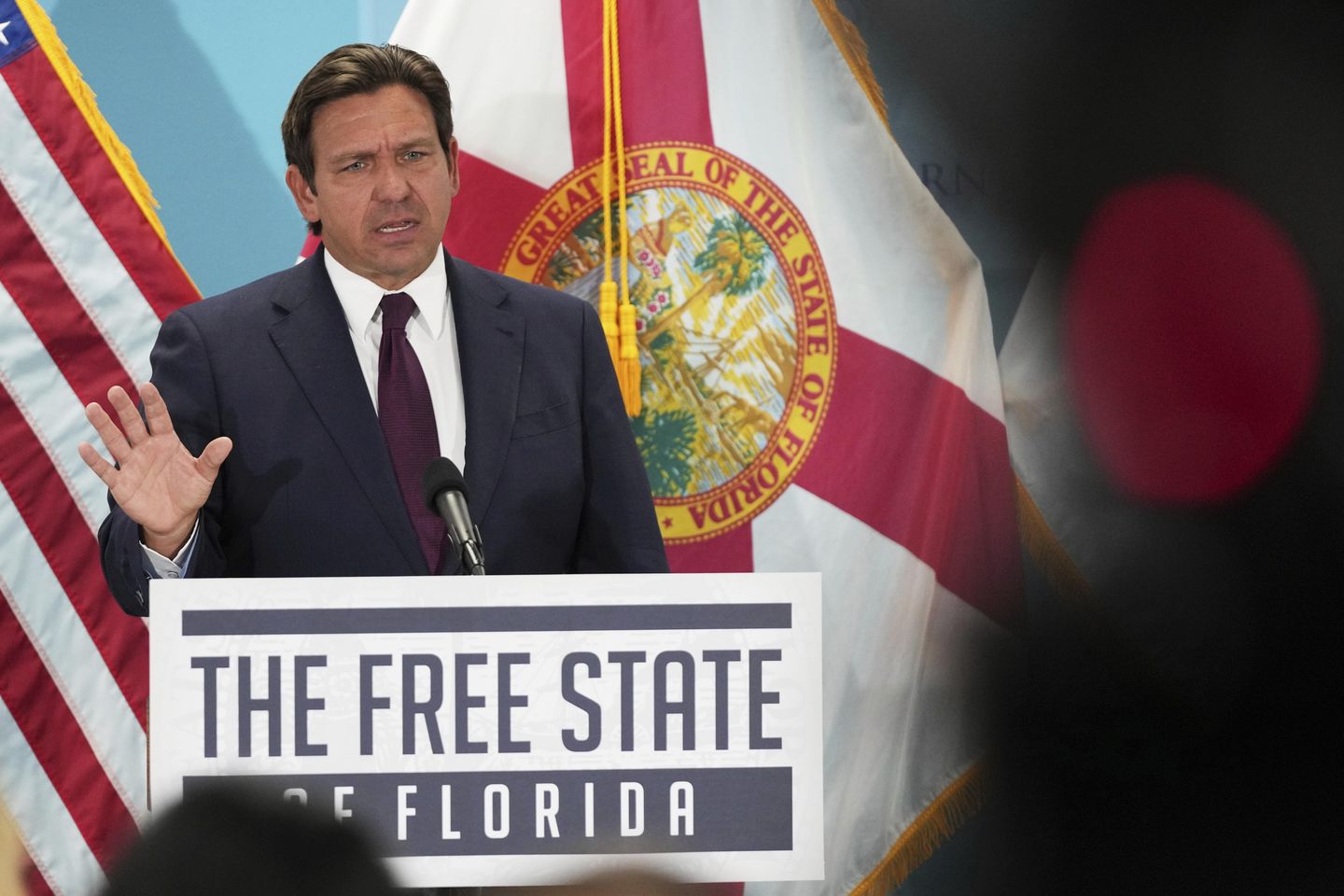
DALLAS — Florida Gov. Ron DeSantis, speaking Friday at the State Freedom Caucus Network summit’s second annual dinner, made no explicit indication of his ambitions for 2028, but his remarks about reshaping his state’s electorate sounded like a stump speech, attendees said.
“Looks like [DeSantis] is running for president again,” one dinner guest from Florida said.
Another dinner attendee from Louisiana agreed his speech sounded like he was campaigning but that the governor has a tough hill to climb against Vice President J.D. Vance, who seems like the “heir apparent” to the GOP nomination.
Mr. DeSantis, a founding member of the House Freedom Caucus, told the over 100 lawmakers from 13 state legislatures representing their own freedom caucuses and their guests, that since he was elected twice as Florida’s governor, the state has welcomed more registered GOP voters as he has instituted a more aggressive conservative agenda.
“When I got elected, there were 300,000 more registered Democrats in Florida, and we had never had more registered Republicans in state history,” Mr. DeSantis said. “That’s 2018. Today, we have 1.3 million more registered Republicans than Democrats.
“That’s because people respond to results, and it’s important. But what we’re doing in the states is we are proving that these principles work, and we are showing how a Republican form of government can be preserved and how freedoms can be protected for future generations.”
Mr. DeSantis, who is term-limited and so won’t run again next year, recalled Florida being one of the most competitive states politically in the country for decades, but that has changed since he entered the governor’s mansion.
“Every race last decade, 2010, ’12, ‘14, ‘16, and then my election in ’18. One-point races sometimes. Mine was even less, and Florida was like, ‘Oh, it’s a delicate balance,” he said.
“And I’m here to tell you we then said, we win this big, 20-point victory [in 2022]. What that shows you is that bold conservative policies work.”
Mr. DeSantis boasted about his accomplishments, including his recent victory in an appeals court that lets Florida continue operating the state’s “Alligator Alcatraz,” a first-of-its-kind detention facility in the Everglades that houses and deports illegal immigrants rounded up under the Trump administration’s push to boot migrants.
“We just had a leftist judge say, ‘You can’t do that because you didn’t do an environmental impact statement.’ First of all, state government doesn’t have to do that. And so the media was like, ‘Oh they built this, and now it’s closed.’ I’m like, ‘It’s not closed. We’re still doing it. …Deportations are continuing. … We’ve been through this song and dance before,” Mr. DeSantis said.
“Every time I get out of bed in the morning, I get sued by the left. You can’t be worried about getting sued. That’s what they’re going to do. And they go to liberal judges, and we know, based on the judge, we have no chance in the trial court, and so we know we’ll just win on appeal. So that’s exactly what happens here.”
Meanwhile, “Deportation Depot” opened this week near Jacksonville, with two more migrant centers planned in his state.
Other conservative policy reforms in the state that Mr. DeSantis touted included universal school choice, educational curriculum transparency, efforts to eliminate transgender ideology and DEI in schools, demanding tenured professors at public universities undergo review and keeping the state open during the COVID-19 pandemic.
“I’m proud to say that of all the things we’ve done probably the most impactful was the state of Florida was the most responsible of any entity in this country for dragging this country out of the lockdowns and the mandate,” he said. “Of course kids should have been in school. Of course you shouldn’t mandate masks.
“I’ve gotten involved in a lot of very hot button issues, and I’ve taken a lot of incoming fire in my time. If you add up all the incoming fire that I’ve taken throughout my entire career in elected office and compared to the incoming fire that I received just for COVID … I got more for just COVID than everything else combined.”
Nevertheless, the Florida governor said he was ultimately vindicated and his decisions were “the best, most positive, consequential decisions for the lives of the people I represented.”
Mr. DeSantis is getting blowback for recently proposing to make Florida the first state to end all vaccine mandates, including for schoolchildren.
During his remarks, he said the state is “leaning on medical freedom” and that his administration “does not believe that government should coerce” anyone “when it comes to medical intervention.”
“You have a right to exercise informed consent and make the best decision for yourself and your family, and the laws of the state of Florida reflect that,” he said.
While the Florida governor’s agenda appeared on track with President Trump’s, Mr. DeSantis seemed suspicious about the rapid change with artificial intelligence that the Trump administration has embraced.
“I think we need to recognize that there’s a lot of changes afoot in society with respect to artificial intelligence. I welcome technology that will enhance the human experience,” Mr. DeSantis said. “I do not welcome things that are going to supplant the human experience. We can’t rely on machines to totally take away our responsibility to think for ourselves.”
The governor said his administration is working on an AI individual bill of rights that protects against some technologies “if they run amok.”
“I understand we’re in a new world. I understand things are changing, but I want to be governed by we the people. I do not want to be governed by a handful of oligarchs in Silicon Valley.”
Other conservative policy reforms in the state that Mr. DeSantis touted included universal school choice, educational curriculum transparency, efforts to eliminate transgender ideology and DEI in schools, demanding tenured professors at public universities undergo review and keeping the state open during the COVID-19 pandemic.
“I’m proud to say that of all the things we’ve done probably the most impactful was the state of Florida was the most responsible of any entity in this country for dragging this country out of the lockdowns and the mandate,” he said. “Of course kids should have been in school. Of course you shouldn’t mandate masks.
“I’ve gotten involved in a lot of very hot button issues, and I’ve taken a lot of incoming fire in my time. If you add up all the incoming fire that I’ve taken throughout my entire career in elected office and compared to the incoming fire that I received just for COVID … I got more for just COVID than everything else combined.”
Nevertheless, the Florida governor said he was ultimately vindicated and his decisions were “the best, most positive, consequential decisions for the lives of the people I represented.”
Mr. DeSantis is getting blowback for recently proposing to make Florida the first state to end all vaccine mandates, including for schoolchildren.
During his remarks, he said the state is “leaning on medical freedom” and that his administration “does not believe that government should coerce” anyone “when it comes to medical intervention.”
“You have a right to exercise informed consent and make the best decision for yourself and your family, and the laws of the state of Florida reflect that,” he said.
While the Florida governor’s agenda appeared on track with President Trump’s, Mr. DeSantis seemed suspicious about the rapid change with artificial intelligence that the Trump administration has embraced.
“I think we need to recognize that there’s a lot of changes afoot in society with respect to artificial intelligence. I welcome technology that will enhance the human experience,” Mr. DeSantis said. “I do not welcome things that are going to supplant the human experience. We can’t rely on machines to totally take away our responsibility to think for ourselves.”
The governor said his administration is working on an AI individual bill of rights that protects against some technologies “if they run amok.”
“I understand we’re in a new world. I understand things are changing, but I want to be governed by we the people. I do not want to be governed by a handful of oligarchs in Silicon Valley.”













